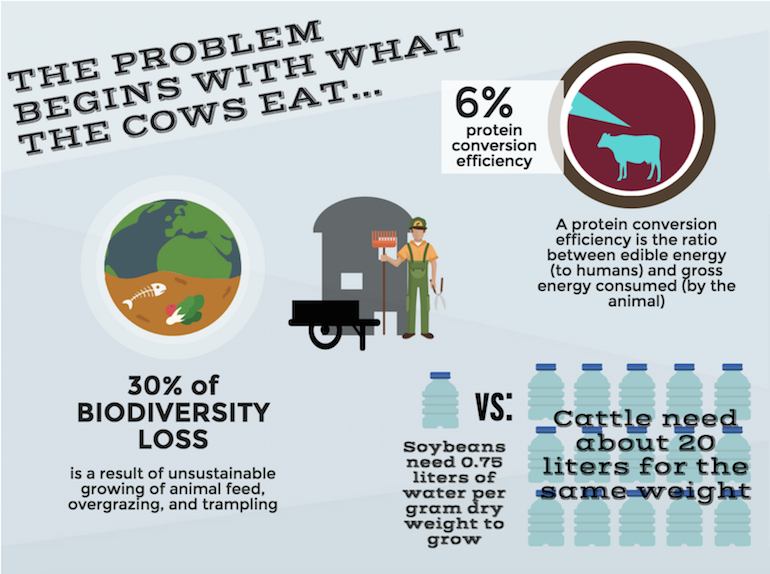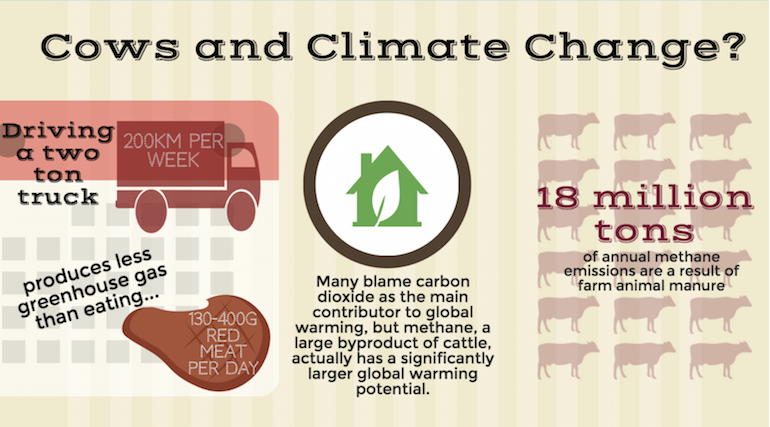With the rise of the Paleo diet, eating red meat is once again popular, even among people trying to lose weight. The Paleo diet encourages dieters to eliminate all grains, sugars, and processed foods, focusing on a high-protein diet, mimicking the way our ancestors lived.
Medical professionals argue our bodies are not capable of processing our present diets, and those who adhere to the Paleo diet can regulate insulin levels, lose weight, and provide more energy. Celebrities like Megan Fox and Jessica Biel are at the forefront of campaigns encouraging people to go Paleo.
So, what’s the best type of food to gather all that protein? Meat. Who doesn’t want an excuse to eat another steak dinner every night? As consumers, what we don’t see, however, is the incredible amount of resources that go into raising and eventually killing a cow for its meat.
These resources could be easily used to grow other crops that provide just as high of a protein content for much less land and water. That’s why the Paleo diet, which may be great for your body, is not so great for our planet.

Graphic by Kirsten Andersen
Let’s start with the land used to raise cattle. Currently, 70% of agricultural land is used by animal production, whether it is for areas where cows can graze or for crops to be grown and consequently fed to animals. And this land takes up about 30% of land surface overall, which means there’s less room to grow other sources of crops that can provide protein to people.
In addition, the unsustainable growing of animal feed has been linked to about 30% of biodiversity loss, especially through overgrazing and trampling, the amount of grain used in high-density feedlots, and the quantity of greenhouse gases emitted.
While many hate tofu, it’s high in protein and there’s a ton of recipes to make it taste awesome (if you need inspiration, check out these delicious and easy recipes). Tofu is derived from soybeans, which are already high in protein. However, farm animals (like cattle) have become increasingly dependent on soybeans, too.
Not only does this deplete the amount of soybeans available for direct human consumption (in tofu), the protein levels of the food are decreased because the soybeans must first sustain the animal before it is killed. This waste of energy is called a protein conversion efficiency — and the percentage for beef is 6%.
In addition to the waste of energy and land by feeding soybeans to cows, we are depleting our water sources rapidly. Per gram dry weight, soybeans require about 0.75 liters of water to grow, but about 20 liters are required for the same weight in cattle.

Graphic by Kirsten Andersen
There are many other, even less tangible effects on the environment as a result of raising cattle. We all know cows produce a TON (actually, 18 million tons) of methane each year. Methane is actually believed to cause even more severe harm to the environment because it traps heat better and stays in the atmosphere for longer. So, while we may not see the damage being done to our atmosphere from our unsustainable food methods, it is always present.
It could be argued that we should focus on our own personal nutrition when planning our diets; after all, what we eat affects our own bodies alone. But, there are some significant external factors to think about when balancing your weekly grocery trip.
People often believe that their daily driving or occasional flying are what have the greatest impact on the environment. However, we eat at least three times every day, 365 days a year — it seems like a no-brainer that we should stop and consider how much of an impact our food choices have on the world around us.
I’ve stopped eating red meat as a personal choice. However, this is not a call for everyone to become a vegetarian. All I ask is that you think before you order your next Double Double Protein Style at In-N-Out, and maybe opt for a vegetarian meal once in a while. If we adjust our diets to become more sustainable to whatever degree we see fit, our combined efforts will not only help the environment, but also various communities around the world.


